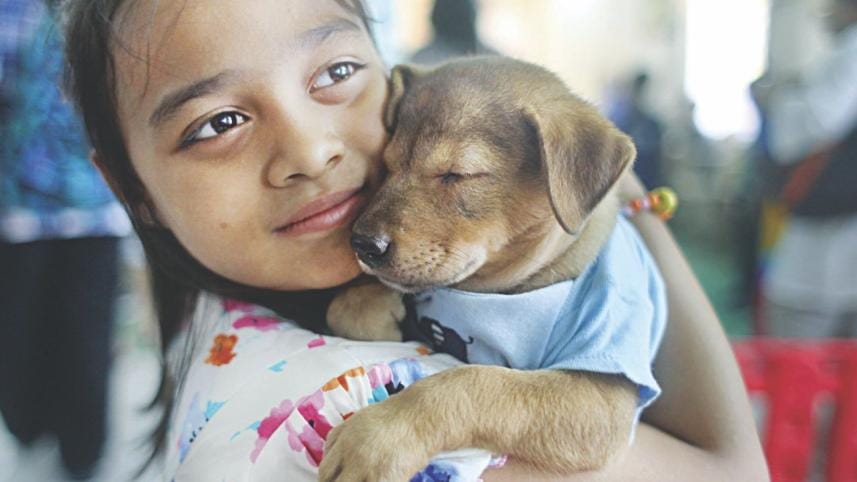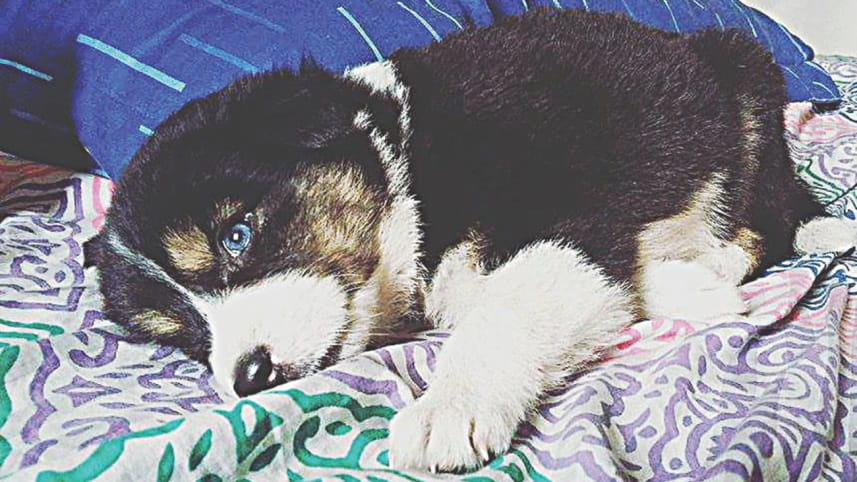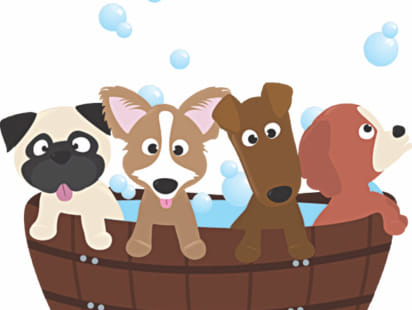Preparing for your first pet dog
While that has worked out for the most part, doing some research before the arrival of my wonderful pet would've definitely prepared me more for the life-long commitment I was casually signing up for. If you'd like to dive head first into the process of looking after a pet dog, here's a few things you need to keep in mind:

PUPPY-PROOF YOUR HOUSE
Puppies are insatiable floof monsters who'll try to destroy anything within grasp. Therefore, you have to make your living space safe for its arrival. Take a good look around your house, especially the room your puppy will be spending the most time in, and try to identify all the items it can bite, chew, or pull down. Be especially wary of things made of leather, faux leather and PVC (mostly bags and shoes) as teething puppies love to sink their teeth into anything soft and rubbery. Objects with sharp edges and breakables should be stowed away as far as possible.
In the first few months, your floofball will try to acquaint itself with the surroundings by licking strange objects (collective internal aww moment, amirite?). Therefore, any household plants, cleaning fluids, and medication should also be moved beyond reach.
FEEDING YOUR PUPPY
Puppies generally need solid food starting from the fourth week, when it needs more calories than it gets from the mother's milk. During that time, you'll need to maintain a steady supply of food packed with all the essential nutrients for normal growth. You'll typically find two flavours of dog food -- beef and milk; and chicken, egg and milk. While you can rest easy knowing that manufactured dog food will provide your beloved fuzz nugget with all the nutrition it needs, it can get expensive after a while, especially if you care for your puppy alone. In that case, meals of boiled rice, meat, and veggies will be just as sufficient.
A common misconception among first-time dog owners is the notion that puppies can eat everything we eat. Dedicated dog lovers often give in to those adorable puppy eyes and share food with them. While it's a touching sentiment, many of the things we eat can be harmful, or even fatal, to dogs.
Here's a few foods to watch out for -- almonds, chocolate, cinnamon, onions, garlic, ice cream, macadamia nuts, caffeinated drinks, grapes, raisins, and food that contains the artificial sweetener xylitol.

FEEDING TIMELINE
6-12 weeks: Growing puppies need the most food during this time; thus, four meals a day should be sufficient.
3-6 months: Decrease meals from four to three a day. During this time, your puppy will typically begin to lose its pudginess and develop a leaner physique. Don't get startled, it's not a sign that your canine pal is underfed.
6-12 months: Start feeding twice daily. Your dog's energy requirements will be slightly lower following spaying or neutering. Hence, you can switch from puppy food to adult dog food during this time. Smaller breeds can make this transition between 7 to 9 months, bigger
breeds between 12 to 14 months.
After 1 year: One complete meal or two half-meals a day.
Your puppy may be a tad temperamental initially, getting anxious or agitated whenever there's a slight change in portions, diet or the meal time. To avoid that, you have to make any transition gradually over 5-7 days. Adhering to a feeding schedule will prevent pupper from developing bad eating habits, including chewing whatever's nearby or even ingesting excrement (that happens surprisingly often). So, if you have a feeding schedule, stick to it.
BUY THE ESSENTIALS
Given the lack of quality pet products available locally, shopping for your first pet can be quite waggravating (see what I did there?). But if you're aware of what to get and where to get them, shopping for your pet can become the fun part of the preparations. The most immediate things your puppy will need are food, leash and collar, a comfortable bed, two bowls (for food and water) and most importantly, a steel crate. Crates provide a confined area where you can housetrain your puppy. You could even replicate a cozy den by fitting a soft bed and blankets into the crate like I did. The bed should be big enough for your puppy to eventually grow into.
If you're willing to splurge a little, invest in a baby gate or a playpen to help you train your puppy to stay within certain areas of the house. Online pet stores such as Pet Bangla, pet.com.bd and Petco Bangladesh offer most of the essentials, except affordable puppy crates.

GROOMING
Even when your puppy is still young, you'll need to groom him or her quite often, especially when they're more likely to run amok and get dirty. Some grooming staples to have at hand include a bristle brush, nail clippers, anti-tick and anti-flea dog shampoo, anti-flea spray, towel, deworming tablets, toothbrush and toothpaste. You can bathe your puppy as often as you want but once a week is standard. The online pet stores mentioned earlier offer some great options to get you started.
VETS AND VACCINATION
Pet owners often underestimate the importance of vaccination; taking care of a pet can be quite an intimidating task, and perhaps one of the most important part of that care involves puppy vaccinations during the first year. Visiting a vet multiple times may seem like an inconvenience, but it could protect your puppy from dangerous but preventable diseases. Hence, find a vet that lives nearby so that you can easily take your pup for annual checkups. Fortunately, most online pet stores provide contact information of reliable vets on their websites, including the websites linked above.
Puppies typically need to be vaccinated after the first 6 months. Obhoyaronno - Bangladesh Animal Welfare Foundation, located at Mohakhali DNCC Market, provides two different vaccinations options: only rabies (BDT 300) or a combined dog vaccination kit called Eurican LR (BDT 1000). They also have trained professionals on board who can educate you about the different options. Spaying and neutering costs BDT 2500 and 2000 respectively for foreign breeds, and BDT 1250 and 1000 respectively for local breeds.
Learn more about Obhoyaronno - Bangladesh Animal Welfare Foundation at http://bit.ly/2wnQYCO

TRAINING
There's no tried and tested method to training your puppy. Even the most seasoned dog owners can vouch that training is a continuous, arduous, and lifelong process. I'm still figuring this one out, so until then, YouTube's your best friend.
Check out these popular channels:
Zak George's Dog Training rEvolution: http://bit.ly/2ojUzxd
Training Positive: http://bit.ly/1nC5ZIw
Kikopup: http://bit.ly/28pvBhG
Mithi Chowdhury is a dog-loving-movie-watching-mediocrity-fearing normal person. Either that or a penguin. Find out at mithichy612@gmail.com




Comments